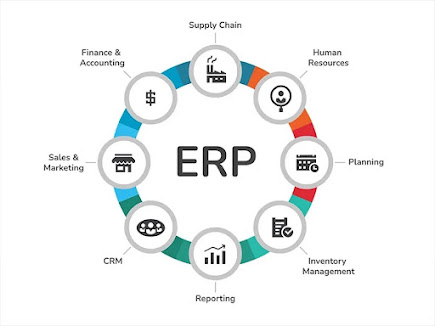The Benefits of an ERP System
An ERP system, or enterprise resource planning system, is a type of business software that helps organizations manage and automate their day-to-day operations. An ERP system typically includes modules for accounting, human resources, customer relationship management (CRM), inventory management, and supply chain management. In this blog post, we'll explore some of the benefits of using an ERP system.
Improved decision-making:
An ERP system gives managers and executives real-time visibility into all aspects of the business, from sales and marketing to finance and operations. This information can be used to make informed decisions about where to allocate resources and how to improve efficiency.
Increased productivity:
By automating repetitive tasks and consolidating information into a single system, an ERP system can help employees work more efficiently. In addition, an ERP system can give employees easy access to the information they need to do their jobs, which can further improve productivity.
Reduced costs:
An ERP system can help businesses save money in several ways, including reducing the need for paper records, reducing duplicate data entry, and automating tasks such as invoicing and payments. In addition, an ERP system can help businesses negotiate better deals with suppliers by providing them with real-time visibility into inventory levels.
Improved customer service:
An ERP system can help businesses keep track of customer orders and address any issues that may arise. In addition, by giving customer service representatives easy access to information about a customer's purchase history and preferences, an ERP system can help them provide better service.
Greater scalability:
As a business grows, it can be difficult to add new processes or modules to existing software systems. However, an ERP system is designed to be scalable, which means it can easily accommodate the needs of a growing business.
What are the benefits of using an ERP system for accounting?
There are many benefits of using an ERP system for accounting, such as:
- Increased accuracy and efficiency
- Reduced data entry time and effort
- Improved visibility into business operations
- Easier access to real-time data for decision making
- Greater control over financials and operations
There are many other benefits that businesses can enjoy when they switch to an ERP system for accounting. For example, ERPNext is a great choice because it is open source and can be tailored to meet the specific needs of your business. It is also cloud-based, so it can be accessed from any device with an internet connection. This makes it perfect for businesses that are constantly on the go.
How does an ERP system help businesses manage their finances?
An ERP system is a comprehensive system that helps businesses manage a wide range of financial tasks, from accounting and invoicing to purchasing and payroll. An ERP system integrates all the data from these different areas into a single system, so businesses can get an accurate overview of their financial status at any time.
ERP systems are typically customizable to meet the needs of individual businesses, and many include features like budgeting and forecasting tools. They can also streamline financial processes, helping businesses save time and money.
ERPNext is a popular ERP system that is free and open source. It has modules for accounting, inventory management, sales orders, purchase orders, project management, and more. It can be
What are some of the most important features of an ERP system for accounting?
An ERP system for accounting should have the ability to manage financial transactions, including invoicing, billing, and payments. It should also allow you to track inventory levels and pricing, as well as control budgeting and forecasting.
ERPNext is a great example of an ERP system that includes all of these features and more. It's been designed specifically for small businesses, so it's easy to use and affordable. And since it's cloud-based, you can access it from anywhere with an internet connection.
Are there any drawbacks to using an ERP system for accounting?
There are many different types of ERP systems, and each one has its benefits and drawbacks. For example, some ERP systems are better suited for small businesses, while others are better for larger businesses.
ERPNext is a particularly good choice for small businesses because it is free and open source. It is also very versatile and customizable, which means that it can be adapted to meet the specific needs of your business. However, there are some drawbacks to using an ERP system like ERPNext. One of the main drawbacks is that it can be difficult to learn how to use it properly. Additionally, it can be expensive to set up and maintain, especially if you need customizations made.
Conclusion:
If you're thinking about implementing an ERP system for your business, there are many things to consider—but the potential benefits are significant. From improved decision-making to increased productivity and reduced costs, an ERP system has the potential to transform the way your business operates. If you're ready to take your business to the next level, an ERP system may be just what you need.


Comments
Post a Comment